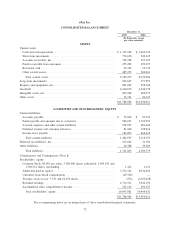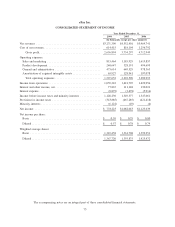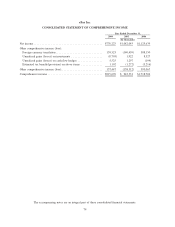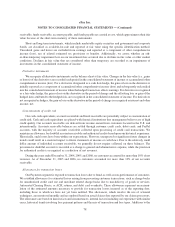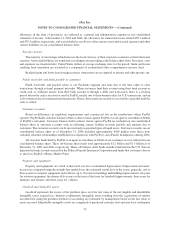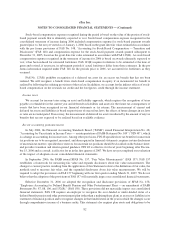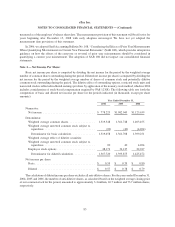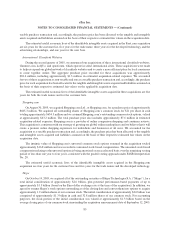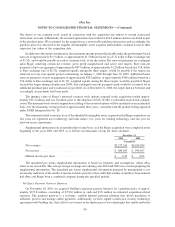eBay 2006 Annual Report Download - page 83
Download and view the complete annual report
Please find page 83 of the 2006 eBay annual report below. You can navigate through the pages in the report by either clicking on the pages listed below, or by using the keyword search tool below to find specific information within the annual report.allowance, in the form of provisions, are reflected as a general and administrative expense in our consolidated
statement of income. At December 31, 2005 and 2006, the allowance for transaction losses totaled $50.3 million
and $79.5 million, respectively, and was included as an offset to other current assets and accrued expenses and other
current liabilities in our consolidated balance sheet.
Foreign currency
The majority of our foreign subsidiaries use the local currency of their respective countries as their functional
currency. Assets and liabilities are translated at exchange rates prevailing at the balance sheet dates. Revenues, costs
and expenses are translated into United States dollars at average exchange rates for the period. Gains and losses
resulting from translation are recorded as a component of accumulated other comprehensive income (loss).
Realized gains and losses from foreign currency transactions are recognized as interest and other income, net.
Funds receivable and funds payable to customers
Funds receivable and payable relate to our Payments segment and arise due to the time taken to clear
transactions through external payment networks. When customers fund their account using their bank account or
credit card, or withdraw money from their bank account or through a debit card transaction, there is a clearing
period before the cash is received or sent by PayPal, usually one to three business days for U.S. transactions, and up
to five business days for international transactions. Hence, these funds are treated as a receivable or payable until the
cash is settled.
Customer accounts
Based on differences in regulatory requirements and commercial law in the jurisdictions where PayPal
operates, PayPal holds customer balances either as direct claims against PayPal or as an agent or custodian on behalf
of PayPal’s customers. Customer balances held as direct claims against PayPal are included on our consolidated
balance sheet as customer accounts with an offsetting current liability in funds payable and amounts due to
customers. The customer accounts can be invested only in specified types of liquid assets. Customer accounts on our
consolidated balance sheet as of December 31, 2006 included approximately $180 million from direct non-
custodial customer relationships established in conjunction with PayPal’s Asia Pacific headquarters during 2006.
All customer funds held by PayPal as an agent or custodian on behalf of our customers are not reflected in our
consolidated balance sheet. These off-balance sheet funds total approximately $1.2 billion and $1.5 billion as of
December 31, 2005 and 2006, respectively. These off-balance sheet funds include funds held in the U.S. that are
deposited in bank accounts insured by the Federal Deposit Insurance Corporation and funds that customers choose
to invest in PayPal’s Money Market Fund.
Property and equipment
Property and equipment are stated at historical cost less accumulated depreciation. Depreciation and amor-
tization are computed using the straight-line method over the estimated useful lives of the assets, generally, one to
three years for computer equipment and software, up to 30 years for buildings and building improvements, ten years
for aviation equipment, the shorter of five years or the term of the lease for leasehold improvements, three years for
furniture and fixtures and three years for vehicles.
Goodwill and intangible assets
Goodwill represents the excess of the purchase price over the fair value of the net tangible and identifiable
intangible assets acquired in a business combination. Intangible assets resulting from the acquisitions of entities
accounted for using the purchase method of accounting are estimated by management based on the fair value of
assets received. Identifiable intangible assets are comprised of purchased customer lists and user base, trademarks
79
eBay Inc.
NOTES TO CONSOLIDATED FINANCIAL STATEMENTS — (Continued)





